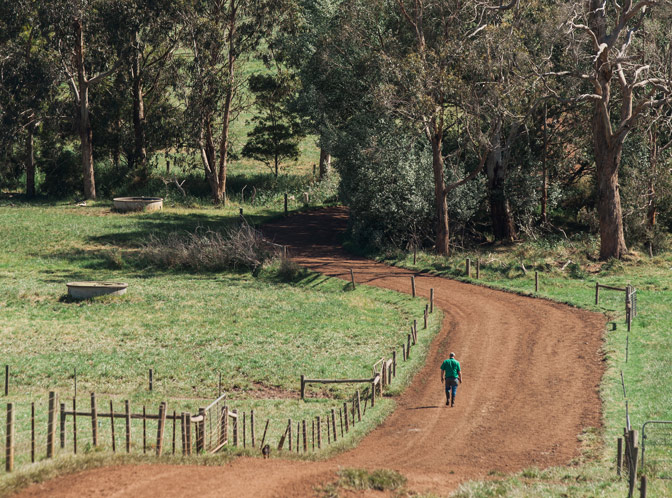Key facts
Duration
Students are likely to undertake the GCAHM on a part-time basis over Trimesters 1 and 2 with the option of concluding elective units in Trimester 3. One core unit will run on campus in block mode – please refer to individual unit handbook entries for further details.
Locations
Some attendance is required at the National Centre for Farmer Health, Deakin centre, affiliated industry or other physical site.
OnlineKey dates
Direct applications to Deakin for Trimester 2 2024 close 23 June 2024
Current Deakin Students
To access your official course details for the year you started your degree, please visit the handbook
Course overview
Improve the social, physical and mental health of agricultural communities across Australia with our Graduate Certificate of Agricultural Health and Medicine.
This course aims to allow students an insight into the physical and mental health issues encountered by people within the agricultural industry. You will explore what influences higher rates of morbidity and mortality in rural and remote Australia, and what influences successful health policies and safety intervention programs.
By understanding these issues, along with learning the impact of poor health on agribusiness, agricultural production and sustainability, you will be placed to make a significant difference in Australia’s agricultural communities.
Read MoreCourse information
- Award granted
- Graduate Certificate of Agricultural Health and Medicine
- Year
2024 course information
- Deakin code
- H522
- Level
- Postgraduate (Graduate Certificate and Graduate Diploma)
- Australian Qualifications Framework (AQF) recognition
The award conferred upon completion is recognised in the Australian Qualifications Framework at Level 8.
Course structure
To complete the Graduate Certificate of Agricultural Health and Medicine students must attain 4 credit points, of which 2 credit points must be the core units HMF701 Agricultural Health and Medicine and HMF702 Healthy and Sustainable Agricultural Communities.
The course structure is highly flexible and permits you to commence your studies with either HMF701 in Trimester 1 or HMF702 in Trimester 2 and then undertake 2 credit points from the course-grouped electives in the coursework stream.
You will have the flexibility to choose any combination of the 5 listed elective units or alternatively you may choose unlisted 700-level units provided the units are relevant to the field of Agricultural Health and Medicine and you have written approval from your course director.
All commencing Faculty of Health Undergraduate and Postgraduate course work students are required to complete DAI001 Academic Integrity Module (0-credit-point compulsory unit) in their first trimester of study.
Students are required to meet the University's academic progress and conduct requirements.
Core units
Coursework Stream
2 credit points from:
Public Health electives
Health Promotion electives
Nursing electives
* Or alternatively you may choose any 700-level units provided the units are relevant to the field of Agricultural Health and Medicine and you have written approval from your course director
Intakes by location
The availability of a course varies across locations and intakes. This means that a course offered in Trimester 1 may not be offered in the same location for Trimester 2 or 3. Check each intake for up-to-date information on when and where you can commence your studies.
Trimester 1 - March
- Start date: March
- Available at:
- Online
Trimester 2 - July
- Start date: July
- Available at:
- Online
Some attendance is required at the National Centre for Farmer Health, Deakin centre, affiliated industry or other physical site.
Additional course information
Enrolment and visa requirements
All places offered to International students in this course are offered as off campus students. Deakin University is making no undertaking that an offer of on campus study may be made in the future. Should students wish to change to on campus mode in the future, they will be assessed in accordance with Deakin University admission guidelines at that time. Deakin University is not obligated to provide any students with a COE (confirmation of enrolment) to facilitate a student visa application.
Deakin University offers many off campus units which may include a compulsory on campus component or residential. It is the student’s responsibility to ensure that they understand the visa options available to them to allow for them to be in Australia and on campus to complete these requirements.
This program includes a compulsory week long on-campus intensive component held at a Deakin University campus. Students are required to obtain a visitor visa to undertake these compulsory intensive classes. Students are unable to apply for a student visa for this course.
Course duration
Course duration may be affected by delays in completing course requirements, such as accessing or completing work placements.
Mandatory student checks
There are no mandatory student checks required for this course.
Workload
As a student in an online course in the Faculty of Health you will be expected to spend 8-10 hours every week studying, interacting online and completing assessment tasks for each unit in your course. You will also be expected to attend the National Centre for Farmer Health, Deakin centre, affiliated industry or other physical site - see individual unit descriptions for full details.
Participation requirements
Compulsory attendance is required at a 5 day intensive workshop.
International students studying online may not be granted a visitor visa to complete mandatory components of the course at a campus.
Placement can occur at any time, including during standard holiday breaks. Learn about key dates at Deakin.Elective units may be selected that include compulsory placements, work-based training, community-based learning or collaborative research training arrangements.
Reasonable adjustments to participation and other course requirements will be made for students with a disability. More information available at Disability support services.
Work experience
Not applicable
Need help?
Ask a question about studying at Deakin
Entry requirements
Selection is based on a holistic consideration of your academic merit, work experience, likelihood of success, availability of places, participation requirements, regulatory requirements, and individual circumstances. You will need to meet the minimum academic and English language proficiency requirements to be considered for selection, but this does not guarantee admission.
Please note, there are limited places in this course and entry is competitive. Applicants are strongly encouraged to submit an application as soon as possible. Applications for this course may close prior to the published closing date if all places are filled.
Academic requirements
To be considered for admission to this degree you will need to meet at least one of the following criteria:
- completion of a bachelor degree or higher
- two years' relevant work experience (or part-time equivalent)
English language proficiency requirements
To meet the English language proficiency requirements of this course, you will need to demonstrate at least one of the following:
- bachelor degree from a recognised English-speaking country
- IELTS overall score of 6.5 (with no band score less than 6.0) in each component of test
- other evidence of English language proficiency (learn more about other ways to satisfy the requirements)
Admissions information
Learn more about Deakin courses and how we compare to other universities when it comes to the quality of our teaching and learning.
Not sure if you can get into Deakin postgraduate study? Postgraduate study doesn’t have to be a balancing act; we provide flexible course entry and exit options based on your desired career outcomes and the time you are able to commit to your study.
Recognition of prior learning
Recognition of prior learning may be granted for up to two credit points. Students must submit a completed Recognition of prior learning application form and contact the course director.
Fees and scholarships
Fee information
Learn more about fees and your options for paying.
The available fee places for this course are detailed above. Not all courses at Deakin have Commonwealth supported places available.
The 'Estimated tuition fee' is provided as a guide only based on a typical enrolment of students completing this course within the same year as they started. The cost will vary depending on the units you choose, your study load, the length of your course and any approved Recognition of prior learning.
One year full-time study load is typically represented by four credit points of study for Graduate Certificates. Each unit you enrol in has a credit point value. The 'Estimated tuition fee' is calculated by adding together four credit points of a typical combination of units for your course.
You can find the credit point value of each unit under the Unit Description by searching for the unit in the Handbook.
Learn more about fees and available payment options.
FEE-HELP calculator
What is FEE-HELP?
FEE-HELP loans cover up to 100% of tuition fees for eligible students. By taking out a FEE-HELP loan, the government pays your tuition fees directly to Deakin, and the balance is repaid from your employment income - but only once you're earning over $51,550.
Please note: fees shown by the calculator are indicative only and based on 2024 rates. Actual fees may vary. We advise confirming fees with Prospective Student Enquiries prior to enrolment.
Estimate your FEE-HELP
FEE-HELP payments
per pay cycle
Take-home pay
after FEE-HELP and tax
per pay cycle
Your estimated FEE-HELP repayments
- $* is the estimated full cost for a Graduate Certificate of Agricultural Health and Medicine (4 credit points), based on the 2024 fees.
- is the annual FEE-HELP payment, based on your current salary
- of your current salary be spent on FEE-HELP
*Disclaimer
Deakin University (Deakin):
- gives no warranty and accepts no responsibility for the currency, accuracy or the completeness of the information provided;
- advises users that no reliance should be placed upon on the information provided, and;
- instructs users that they should confirm the actual course fee with Prospective Student Enquiries prior to enrolment.
This tool provides indicative information about the fees that will be payable in respect of courses and subjects offered to prospective students domiciled in Australia during the periods indicated.
Please note that the fees shown by the calculator are indicative only and actual fees may vary. Users are advised to confirm the actual course fee with Prospective Student Enquiries prior to enrolment.
The estimated course fee is based on the tuition fee costs applicable to a domestic full time student commencing the course in Trimester 1 and studying full time for the duration of the course but:
- does not include non-tuition costs that may apply, such as Student Services and Amenities Fees (SSAF);
- does not take into account any scholarships or bursaries awarded to the student (including the 10% Deakin alumni discount);
- assumes the maximum number of units that need to be successfully completed actual number completed may be reduced if recognition of prior learning is granted;
- assumes that no exceptional, or non-typical, circumstances apply to the proposed course of study;
- assumes that the options that the user selects are appropriate for the course of study that they intend to undertake;
- where fees are estimated for future years those fee will be subject to annual increases in accordance with increases in the cost of course delivery.
Scholarship options
A Deakin scholarship might change your life. If you've got something special to offer Deakin – or you just need the financial help to get you here – we may have a scholarship opportunity for you.
Postgraduate bursary
If you’re a Deakin alumnus commencing a postgraduate award course, you may be eligible to receive a 10% reduction per unit on your enrolment fees.
Apply now
Some of our courses have limited places available - for the latest on courses still open for application, visit Courses by trimester.
Create an account in the Deakin Application Portal, start your application, enter personal details, education experience, upload supporting documents and submit. Need help? Play this video, or contact one of our friendly future student advisers on 1800 693 888 or submit an online enquiry.
For more information on the application process and closing dates, see the How to apply webpage. If you're still having problems, please contact us for assistance.
Research Information
Students may undertake a research stream consisting of two units, HSH731 Minor Project A and HSH732 Minor Project B, covering research integrity specifically. The units enable students to improve their knowledge and skills in research planning, conduct, and presentation of findings relative to public health. Students conduct research-based tasks and make a significant contribution to a research-based project in their relevant field of study.
Entry pathways
This course provides a pathway to further postgraduate coursework programs.
Contact information
Our friendly advisers are available to speak to you one-on-one about your study options, support services and how we can help you further your career.
- Call us: 1800 693 888 Mon–Fri, 9am–5pm
- Live Chat: Mon–Thurs, 8am–7pm, Fri 8am–5pm
- Submit an online enquiry
- Help hub find common and trending questions and answers
Careers
Career outcomes
The Graduate Certificate of Agricultural Health and Medicine (GCAHM) opens a variety of exciting career paths by providing students with a strong foundation in agricultural health, safety, wellbeing and sustainability. After successful completion of this course you will have the academic, practical and research skills to work in a range of career paths spanning health service provision, rural research, health management, health promotion, agricultural productivity, sustainability and rural policy. The GCAHM provides an important opportunity to those who are currently, or plan to be, rural and remote professionals in the fields of medicine, nursing, health, health management, rural policy, WH&S and agriculture.
Professional recognition
This course is currently accredited as at the date of publishing. The eligibility of students to be recognised as an AgriSafeTM practitioner is subject to meeting the requirements of AgriSafeTM . Deakin University makes no representation that students will meet those requirements.
Course learning outcomes
Deakin's graduate learning outcomes describe the knowledge and capabilities graduates can demonstrate at the completion of their course. These outcomes mean that regardless of the Deakin course you undertake, you can rest assured your degree will teach you the skills and professional attributes that employers value. They'll set you up to learn and work effectively in the future.
| Graduate Learning Outcomes | Course Learning Outcomes |
| Discipline-specific knowledge and capabilities | Apply the general principles of agricultural health and medicine in the professional environment. |
| Communication | Demonstrate verbal, written and interpersonal communication skills using discipline-specific language and lay-terms necessary to explain and justify decisions to consumers, communities and professional colleagues. |
| Digital literacy | Demonstrate knowledge and skills regarding the latest technological developments including social media; and select and use appropriate technologies to conduct research; and provide information to people in agricultural settings. |
| Critical thinking | Critically evaluate policy, promotional and scholarly materials, research data, and farming environments; to make recommendations to influence and/or improve the health, wellbeing and safety of Australian agricultural communities. |
| Problem solving | Display flexibility and independence in applying an advanced body of knowledge, within the field of agricultural health and medicine, to solve problems regarding health, wellbeing and safety within agricultural communities. |
| Self-management | Establish and maintain a lifelong commitment to applying research knowledge and principles in an evidence-based collaborative approach to agricultural health and medicine, demonstrated through reflective practice and leadership. |
| Teamwork | Establish and maintain collaborative, professional and respectful relationships when working in a team to achieve a common goal and take a leadership role when appropriate. |
| Global citizenship | Apply knowledge of cultural, social and broader international matters in the field of agricultural health and medicine and act in a responsive manner to regional and rural issues. |




